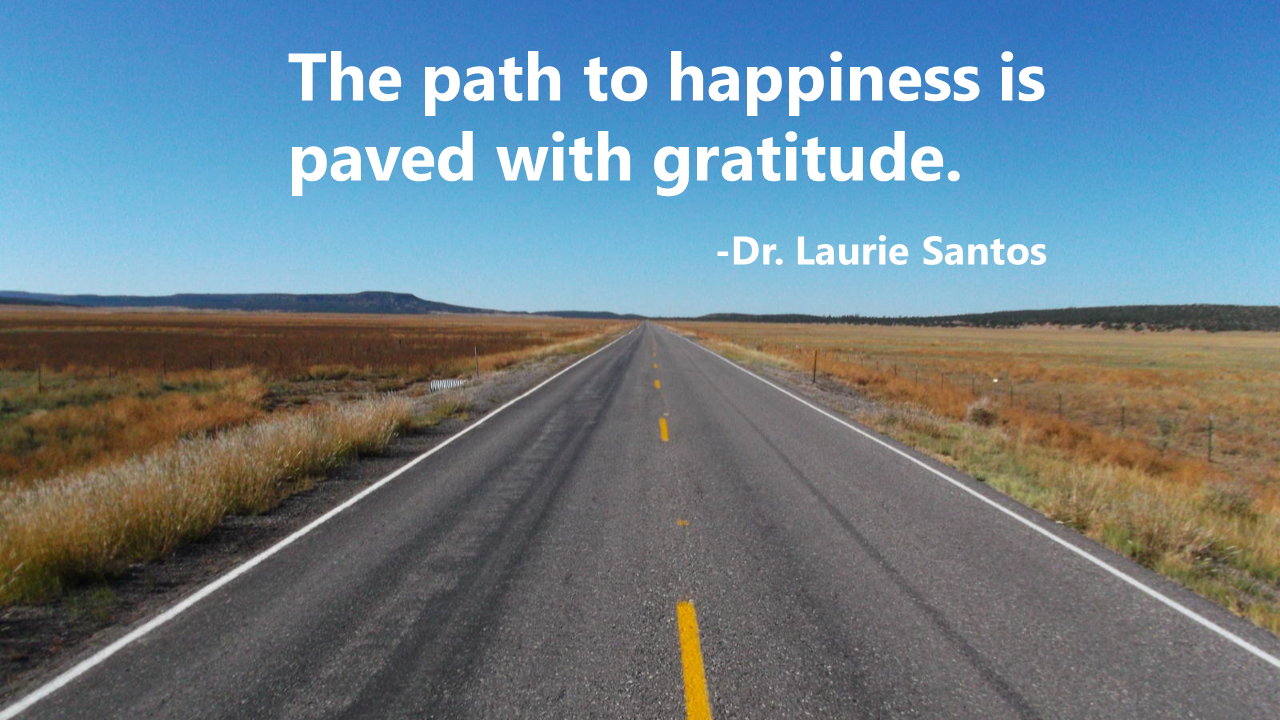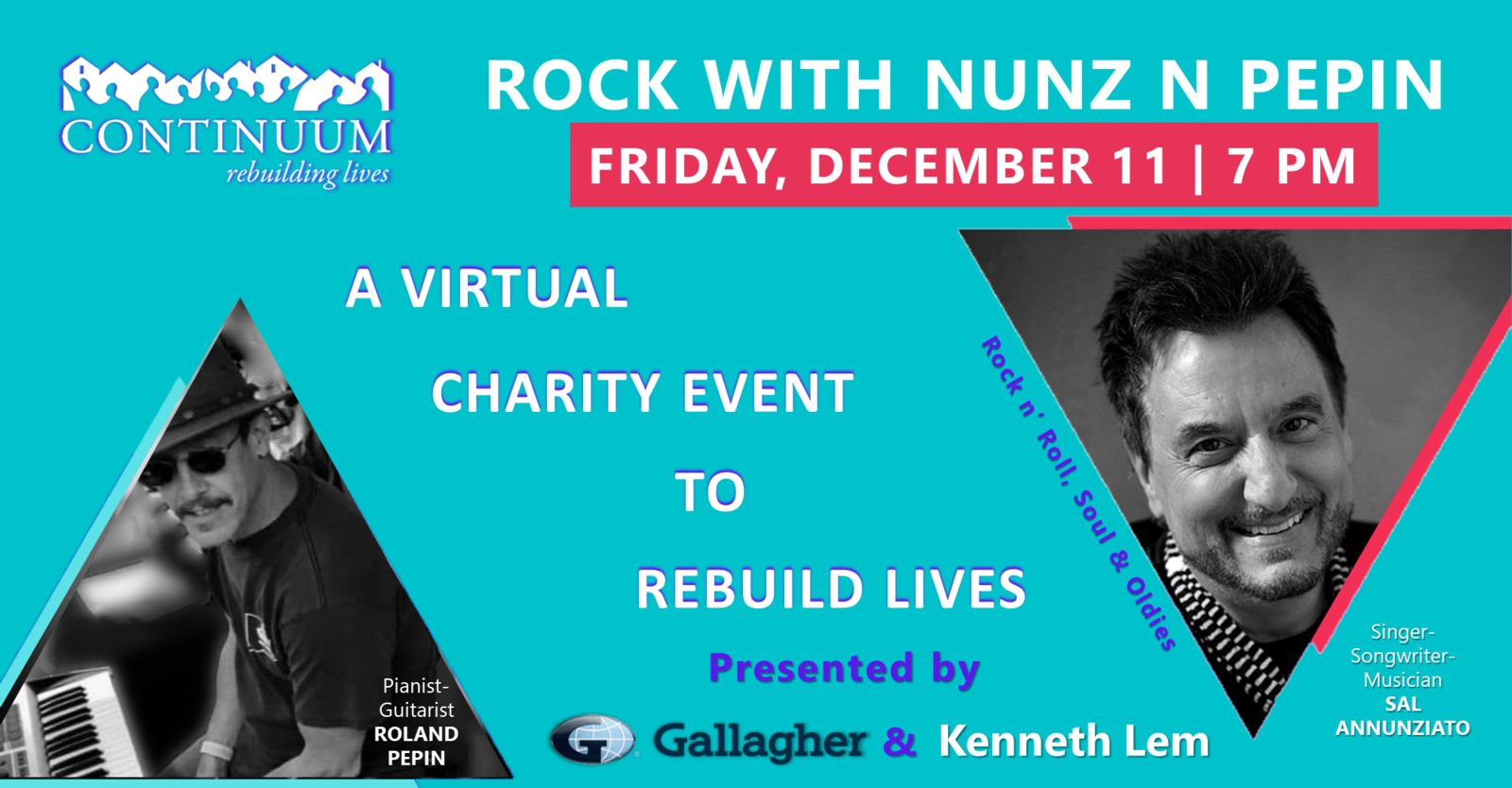November 2020 Newsletter: So grateful...
Wednesday, November 11, 2020
In This Issue
Grateful to Our Veterans Who Have Served
Power of Gratitude
New Date & Time: Rock with Nunz n Pepin
Grateful to Our Veterans Who Have Served
 This month, we pay tribute to our country’s Veterans who are dear to our hearts. Continuum’s Veterans Recovery Support Program is a collaborative effort with the Veterans Hospital. It offers crisis stabilization beds alongside outpatient clinical care and day services as a short-term alternative to psychiatric inpatient hospital care.
This month, we pay tribute to our country’s Veterans who are dear to our hearts. Continuum’s Veterans Recovery Support Program is a collaborative effort with the Veterans Hospital. It offers crisis stabilization beds alongside outpatient clinical care and day services as a short-term alternative to psychiatric inpatient hospital care.
The program provides a comfortable, peaceful home-like environment and assists with a successful transition back to the community after stabilizing, while maintaining clinical and community support. The program serves approximately 115 Veterans each year.
Charles is an Air Force Veteran from the Vietnam era. He says he feels like he suffers from PTSD, although he has never been officially diagnosed. He has struggled with substance use for a long time, and it almost ruined his life.
Here is his story:
“I first started with alcohol. Then one day I was introduced to cocaine. My life was getting really uncontrollable. My wife told me to go get help, that she loved me and didn’t want to lose me. She said she would stand by my side 100%.”
Charles has been a client at Continuum’s Veteran’s Recovery Support Program and, although he was discharged close to two years ago, he continues to stay connected.
“Being in Continuum’s VA House helped me so much. Listening to other Veterans’ stories and sharing mine gave me so much hope. I feel so much love from the staff each time I have come back, and it wasn’t easy for me to accept that I couldn’t do it by myself.
I learned to put God first and then everybody else afterwards. When I feel weak and lonely I call the staff at the VA house and they make me feel what I need to feel to get through the day. They let me know they are so proud of me. No lie – I call them every day. I tell my wife I just want to drive over there and stand outside and wave.
They saved my life, and I am so grateful… My wife thanks them too.”
Members of Continuum’s staff confirm that Charles calls them every day to check in and let them know how he is doing for the day. Even though the conversation is sometimes only a very brief check-in, he tells us this helps him and keeps him accountable. He lets us know what is happening in his life, shares his struggles, and continues to work on himself daily. We welcome his calls because we genuinely care about Charles and want to support him along his journey. Being there for our clients even after they have long left our programs is a quality rarely found.
Continuum is honored to be able to support our Veterans who have served our country so freely over the years. Continuum is committed to helping all our clients to rebuild their lives. Rebuilding and maintaining are ongoing processes for us all.
Gratitude can transform common days into thanksgivings, turn routine jobs into joy, and change ordinary opportunities into blessings.” - William Arthur Ward
 Between the pandemic and global social unrest, 2020 has thrown a lot our way. “Nearly 1 in 5 adults (19%) say their mental health is worse than it was at this time last year,” says a recent survey from the American Psychological Association.
Between the pandemic and global social unrest, 2020 has thrown a lot our way. “Nearly 1 in 5 adults (19%) say their mental health is worse than it was at this time last year,” says a recent survey from the American Psychological Association.
Uncertainty, change and loss are the norm, as are feelings of isolation, anxiety, and burnout. The end is not predictable yet, and anticipating the upcoming holidays may further throw many people’s lives into a tailspin.
While life may feel overwhelming, dwelling on the negative can amplify those feelings. Conversely, cultivating gratitude can help you more easily navigate through these stressful times.
What’s So Good About Gratitude?
As a state of thankfulness and appreciation for the positive aspects of life, gratitude helps shift the focus toward the positive in your life and connects you to others and the world around you.
Much behavioral and psychological research has found that practicing gratitude improves mental and physical health with its long lasting effect on the brain and nervous system.
Regular practice changes the neural structure of the brain, triggering good hormones and activating neurotransmitters that manage our emotions, like serotonin, dopamine, and norepinephrine.
According to UC Davis psychologist Dr. Robert A. Emmons, one of the world’s leading scientific experts on gratitude, practicing gratitude can:
- Strengthen the immune system
- Reduce aches and pains
- Lower blood pressure and boost cardiac functioning
- Improve sleep quality
- Instill a sense of being more alert, energetic, and alive
- Increase joy, optimism, and happiness
- Foster feelings of helpfulness, generosity, compassion, and forgiveness
- Decrease feelings of loneliness and isolation.

Practice Gratitude Every Day
Practicing gratitude can be as simple as making it a habit to say “Thank you” while showering in the morning, acknowledging that others less fortunate don’t have running water. Or it can be as easy as sending a quick text to reach out a friend.
You can cultivate gratitude in your everyday life. Here are just a few ideas:
Write in a gratitude journal (at least) three times a week. Studies indicate that this practice contributes to a greater sense of wellbeing. “It can help you re-experience the thing you’re grateful for,” says Dr. Laurie Santos, Yale psychology professor and leading expert in positive psychology.
Send a surprise gift with a card expressing your gratitude for someone. A study in the Journal of Happiness Studies found that “spending as little as five dollars on someone else can lead to higher levels of happiness at the end of the day.” Expressing gratitude for someone else will not only brighten their day but also increase your own feelings of gratitude.
Be present. Take a few minutes to notice your surroundings: sounds, smells, colors, and visuals. Notice how you feel physically and mentally. Take note of the things that make you feel good.
Reframe a negative or stressful situation into a positive one. Ask yourself what you can learn. For example, reflect on the unexpected positive effects of the pandemic. Have you been able to reconnect with any unexpected people now that more activities are virtual?
Gratitude at Continuum
Despite the numerous challenges Continuum’s vulnerable clients face, especially this year, they often express that they have much to be thankful for. For example, they are grateful they:
- have a home where they once were hospitalized, homeless, or institutionalized.
- are learning skills to increase their independence and ability to thrive in the community.
- finally have the support they need to go forward on the journey to rebuild their lives.
We at Continuum are grateful for your support.
Take a moment to think. What are you grateful for?
New Date & Time: Rock with Nunz n Pepin
We are happy to announce the new date and time for our virtual charity concert Rock with Nunz n Pepin: Friday, December 11 at 7 pm.
Join us for a fun time jamming to classic rock. Enter the raffle and you may win a prize. Even better ... it costs nothing to attend.
Register or Purchase a Raffle Ticket Here
View Article List
